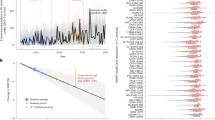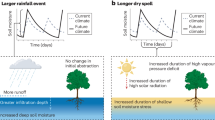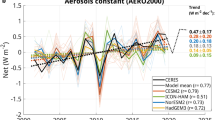Abstract
Projections of climate change impacts on crop yields are inherently uncertain1. Uncertainty is often quantified when projecting future greenhouse gas emissions and their influence on climate2. However, multi-model uncertainty analysis of crop responses to climate change is rare because systematic and objective comparisons among process-based crop simulation models1,3 are difficult4. Here we present the largest standardized model intercomparison for climate change impacts so far. We found that individual crop models are able to simulate measured wheat grain yields accurately under a range of environments, particularly if the input information is sufficient. However, simulated climate change impacts vary across models owing to differences in model structures and parameter values. A greater proportion of the uncertainty in climate change impact projections was due to variations among crop models than to variations among downscaled general circulation models. Uncertainties in simulated impacts increased with CO2 concentrations and associated warming. These impact uncertainties can be reduced by improving temperature and CO2 relationships in models and better quantified through use of multi-model ensembles. Less uncertainty in describing how climate change may affect agricultural productivity will aid adaptation strategy development andpolicymaking.
This is a preview of subscription content, access via your institution
Access options
Subscribe to this journal
Receive 12 print issues and online access
$209.00 per year
only $17.42 per issue
Buy this article
- Purchase on Springer Link
- Instant access to full article PDF
Prices may be subject to local taxes which are calculated during checkout




Similar content being viewed by others
References
Godfray, H. C. J. et al. Food security: The challenge of feeding 9 billion people. Science 327, 812–818 (2010).
Moss, R. H. et al. The next generation of scenarios for climate change research and assessment. Nature 463, 747–756 (2010).
White, J. W., Hoogenboom, G., Kimball, B. A. & Wall, G. W. Methodologies for simulating impacts of climate change on crop production. Field Crops Res. 124, 357–368 (2011).
Rötter, R. P., Carter, T. R., Olesen, J. E. & Porter, J. R. Crop-climate models need an overhaul. Nature Clim. Change 1, 175–177 (2011).
Meehl, G. A. et al. The WCRP CMIP3 multimodel dataset—A new era in climate change research. Bull. Am. Meteorol. Soc. 88, 1383–1394 (2007).
Wilby, R. L. et al. A review of climate risk information for adaptation and development planning. Int. J. Clim. 29, 1193–1215 (2009).
Semenov, M. A., Wolf, J., Evans, L. G., Eckersten, H. & Iglesias, A. Comparison of wheat simulation models under climate change. 2. Application of climate change scenarios. Clim. Res. 7, 271–281 (1996).
Tao, F., Zhang, Z., Liu, J. & Yokozawa, M. Modelling the impacts of weather and climate variability on crop productivity over a large area: A new super-ensemble-based probabilistic projection. Agric. Forest Meteorol. 149, 1266–1278 (2009).
Rosenzweig, C. & Parry, M. L. Potential impact of climate change on world food supply. Nature 367, 133–138 (1994).
Lobell, D. B., Schlenker, W. & Costa-Roberts, J. Climate trends and global crop production since 1980. Science 333, 616–620 (2011).
Lobell, D. B. & Burke, M. B. On the use of statistical models to predict crop yield responses to climate change. Agric. Forest Meteorol. 150, 1443–1452 (2010).
Gifford, R. et al. Climate change and Australian wheat yield. Nature 391, 448–449 (1998).
Harris, G. R., Collins, M., Sexton, D. M. H., Murphy, J.M. & Booth, B. B. B. Probabilistic projections for twenty first century European climate. Nature Hazards Earth Syst. Sci. 10, 2009–2020 (2010).
Semenov, M. A. & Stratonovitch, P. Use of multi-model ensembles from global climate models for assessment of climate change impacts. Clim. Res. 41, 1–14 (2010).
Müller, C. Agriculture: Harvesting from uncertainties. Nature Clim. Change 1, 253–254 (2011).
Palosuo, T. et al. Simulation of winter wheat yield and its variability in different climates of Europe: A comparison of eight crop growth models. Eur. J. Agron. 35, 103–114 (2011).
Challinor, A. J., Simelton, E. S., Fraser, E. D. G., Hemming, D. & Collins, M. Increased crop failure due to climate change: Assessing adaptation options using models and socio-economic data for wheat in China. Environ. Res. Lett. 5 (2010).
Hagedorn, R., Doblas-Reyes, F. J. & Palmer, T. N. The rationale behind the success of multi-model ensembles in seasonal forecasting—I. Basic concept. Tellus A 57, 219–233 (2005).
Taylor, S. L., Payton, M. E. & Raun, W. R. Relationship between mean yield, coefficient of variation, mean square error, and plot size in wheat field experiments. Commun. Soil Sci. Plant Anal. 30, 1439–1447 (1999).
Hatfield, J. L. et al. Climate impacts on agriculture: Implications for crop production. Agron. J. 103, 351–370 (2011).
Long, S. P., Ainsworth, E. A., Leakey, A. D. B., Nosberger, J. & Ort, D. R. Food for thought: Lower-than-expected crop yield stimulation with rising CO2 concentrations. Science 312, 1918–1921 (2006).
Ewert, F., Porter, J. R. & Rounsevell, M. D. A. Crop models, CO2, and climate change. Science 315, 459–459 (2007).
Kimball, B. A. in Handbook of Climate Change and Agroecosystems—Impacts, Adaptation, and Mitigation (eds Hillel, D. & Rosenzweig, C.) 87–107 (Imperial College Press, 2011).
Amthor, J. S. Effects of atmospheric CO2 concentration on wheat yield: Review of results from experiments using various approaches to control CO2 concentration. Field Crops Res. 73, 1–34 (2001).
Asseng, S., Foster, I. & Turner, N. C. The impact of temperature variability on wheat yields. Glob. Change Biol. 17, 997–1012 (2011).
Tebaldi, C. & Knutti, R. The use of the multi-model ensemble in probabilistic climate projections. Phil. Trans. R. Soc. A 365, 2053–2075 (2007).
Knutti, R. The end of model democracy? Climatic Change 102, 395–404 (2010).
Challinor, A. J., Wheeler, T., Hemming, D. & Upadhyaya, H. D. Ensemble yield simulations: Crop and climate uncertainties, sensitivity to temperature and genotypic adaptation to climate change. Clim. Res. 38, 117–127 (2009).
Rosenzweig, C. et al. The Agricultural Model Intercomparison and Improvement Project (AgMIP): Protocols and pilot studies. Agr. Forest Meteorol. 170, 166–182 (2013).
Monfreda, C., Ramankutty, N. & Foley, J. A. Farming the planet: 2. Geographic distribution of crop areas, yields, physiological types, and net primary production in the year 2000. Glob. Biogeochem. Cycles 22 (2008).
Author information
Authors and Affiliations
Contributions
S.A., F.E., C.R., J.W.J., K.J.B. and J.L.H. motivated the study; S.A. and F.E. coordinated the study; S.A., F.E., D.W., P.M., D.C. and A.C.R. analysed data; D.C., A.C.R., K.J.B., P.J.T., R.P.R., N.B., B.B., D.R., P.B., P.S., L.H., M.A.S., P.S., C.S., G.O.L., P.K.A., S.N.K., R.C.I., J.W.W., L.A.H., R.G., K.C.K., T.P., J.H., T.O., J.W., I.S., J.E.O., J.D., C.N., S.G., J.I., E.P., T.S., F.T., C.M., K.W., R.G., C.A., I.S., C.B., J.R.W. and A.J.C. carried out crop model simulations and discussed the results; M.T. and S.N.K., provided experimental data; S.A., F.E., C.R. and J.W.J. wrote the paper.
Corresponding author
Ethics declarations
Competing interests
The authors declare no competing financial interests.
Supplementary information
Rights and permissions
About this article
Cite this article
Asseng, S., Ewert, F., Rosenzweig, C. et al. Uncertainty in simulating wheat yields under climate change. Nature Clim Change 3, 827–832 (2013). https://doi.org/10.1038/nclimate1916
Received:
Accepted:
Published:
Issue Date:
DOI: https://doi.org/10.1038/nclimate1916
This article is cited by
-
Knowledge-guided machine learning can improve carbon cycle quantification in agroecosystems
Nature Communications (2024)
-
The impact of climate change on wheat in Turkey
Regional Environmental Change (2024)
-
Substantial increase of heat requirement for maturity of early rice due to extension of reproductive rather vegetative growth period in China
Theoretical and Applied Climatology (2024)
-
An assessment of the vulnerability to climate change of winter wheat and summer maize production in Shandong Province, China
Theoretical and Applied Climatology (2024)
-
The optimization of model ensemble composition and size can enhance the robustness of crop yield projections
Communications Earth & Environment (2023)



